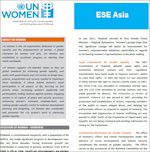Thailand, a constitutional monarchy with a population of 69 million, has made significant progress in development over the last three decades. Strong economic growth has contributed to reduction of poverty incidence from 42% in 1988 to 8% in 2009. Significant improvements are evident in social development, i.e., education, health and social services.
The rapid growth masks socio-economic inequalities, a widening income gap, uneven development between urban and rural areas, and unequal access to resources and social services. Some women groups, such as Muslim women in the deep South, the hill tribe women in the North, HIV positive women, women with disabilities and migrant women workers, still face discrimination and rights violation.
Thailand ranks 92 out of 138 countries on the Gender Inequality Index. Policies relating to women have become a regular part of the government agenda, and Thailand’s efforts to implement CEDAW and the Beijing Platform for Action have had a visible impact on progress towards gender equality.
View online/download
Bibliographic information
UN Women office publishing:
South-East Asia Multi-Country Office (Viet Nam)

